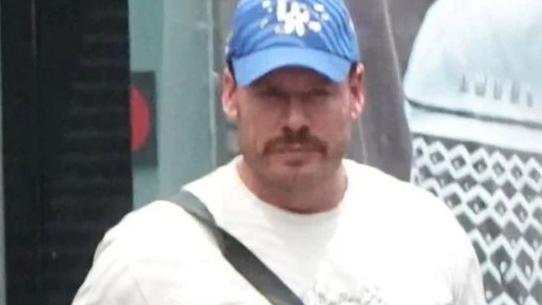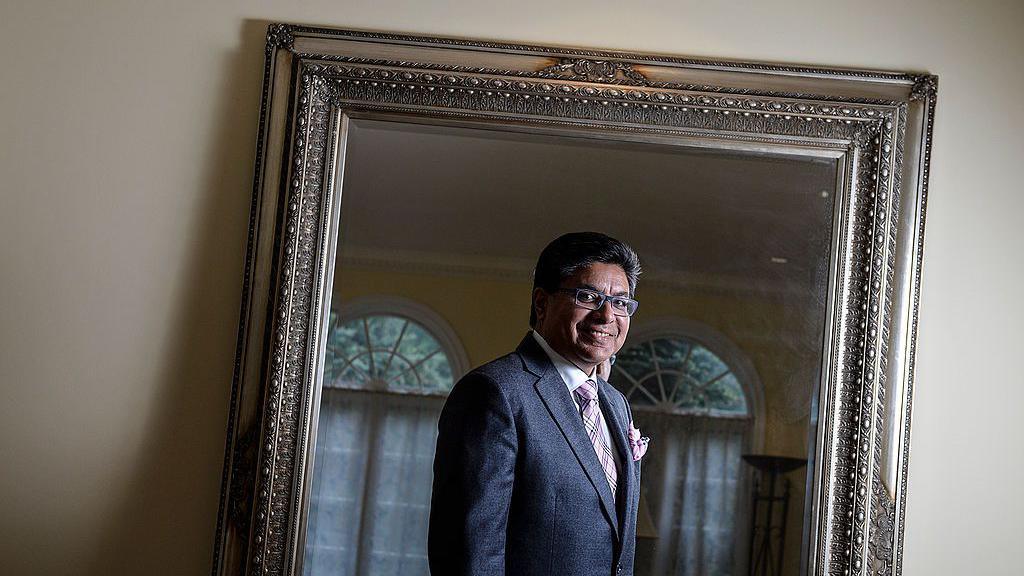How a flashy lawyer and an alleged Canadian drug lord may have taken down an FBI witness

Ryan Wedding pictured last year
- Published
Months before an FBI witness was gunned down in broad daylight, a Toronto-area lawyer allegedly advised his client: "if you kill this witness, the case will be dismissed".
Speaking to media on Wednesday, US attorney Bill Essayli alleged that this advice, between lawyer Deepak Paradkar and Ryan Wedding, a former Olympic snowboarder who ended up on the FBI's most wanted list for allegedly running a sprawling drug trafficking empire, helped trigger a series of events that led to a key federal witness being gunned down at a restaurant in Medellín, Colombia.
In exchange for his services, Mr Paradkar, who for a time posted on social media as @cocaine_lawyer, was allegedly paid in luxury watches and extra lawyer fees.
Those allegations and more were contained in a 54-page FBI indictment that was unsealed on Wednesday by the US Justice Department. It named 19 defendants, including Mr Wedding and Mr Paradkar, as being connected to the murder of the federal witness, named in local media as Jonathan Acebedo-Garcia, in January.
Also included in the alleged scheme to silence a federal witness are a reggaeton musician, a Toronto-based operator of a gang news website and the Colombian madame of a high-end prostitution ring, according to the indictment.
Ten, including Mr Paradkar, are now in custody and facing extradition to the US. None have entered a plea yet, and the allegations have not been proven in court.
Mr Wedding, 44, is still at large, with Canadian and US authorities placing a $15m (£11.5m) bounty on his capture. They have warned that he will stop at nothing to evade the police — even possibly undergoing plastic surgery to avoid being caught.
The case offers an extraordinary look at the underbelly of an alleged multinational, $1-billion-a-year, violent criminal enterprise allegedly led by a former Olympian.
It also puts a spotlight back on Mr Paradkar, who is no stranger to the media in Canada. The criminal lawyer is known for defending Dellen Millard, a wealthy Toronto heir who is a multiple murderer.
At times, Mr Paradkar himself became the story. He faced allegations of helping Millard smuggle clandestine letters from jail to his then-girlfriend, in an effort to sway witnesses in one of his murder trials. Mr Paradkar has denied this.
He was also the subject of a profile in the newspaper the Toronto Sun in 2017, where he was described as being "too flashy for his own good". He wore $1,200 Louboutin shoes to court and flaunted his Maseratis on Instagram.
"I break the mold a bit," Mr Paradkar told the newspaper at the time. "I just do my own thing as long as I stay within professional standards."

Lawyer Deepak Paradkar (pictured here in 2013) is already known to Canadian media, having worked on several high profile cases.
How a sprawling cocaine operation unravelled
Authorities say Mr Wedding enlisted the help of Mr Paradkar when his criminal enterprise started to crumble, after US authorities intercepted one of his cocaine shipments in April 2024 in California. Two other packages were stopped in August and October 2024, and all the couriers were arrested.
In all three cases, Mr Paradkar allegedly arranged legal representation for the couriers in order to give Mr Wedding access to privileged information on his other clients, several of whom Mr Wedding wished to murder, authorities said.
Later in October 2024, the FBI announced a string of arrests in relation to Mr Wedding, identifying him for the first time as the alleged head of a major criminal enterprise with alleged operations across Canada, the US and Latin America.
Authorities revealed that they had an inside man who was co-operating as a key witness in the case. Canadian media have since identified him as Jonathan Acebedo-Garcia, a Canadian-Colombian man who is said to have been a longtime associate of Mr Wedding's.
The drug lord is said to have then enlisted others to track Acebedo-Garcia down, including a Montreal organised crime leader, Atna Ohna, and a Colombian madame, Carmen Yelinet Valoyes Florez.
On the side, Mr Wedding allegedly tapped a Calgary man, Allistair Chapman, to allegedly pay a crime gossip blog C$10,000 to post information about Acebedo-Garcia's whereabouts. Mr Chapman is among those now arrested and facing extradition to the US.
The blog's operator, Gursewak Singh Bal, was also arrested, with authorities alleging he posted a photo of Acebedo-Garcia and his wife to his blog and implying that he is "a snitch".
"Good chance he'll never be found again," Mr Bal allegedly wrote.
Others were said to have been recruited by Mr Ohna and Ms Florez to help track the witness down. Edwin Basora-Hernandez, identified in the indictment as a reggaeton artist living in Canada, allegedly helped secure his phone number in exchange for C$500 to C$1,000.
Another man was allegedly hired by Mr Wedding to fly to Colombia and Saudi Arabia to search for him.
The witness was eventually found in Colombia, where he was tracked down by individuals on a motorcycle to a restaurant inside a shopping centre. Another unnamed suspect then entered, approached Acebedo-Garcia and shot him while he ate, according to the indictment, killing him instantly.
A photo of the corpse was then allegedly sent to Mr Wedding, to be circulated "as a warning" to others who may cross him, the indictment said.
Meanwhile, Mr Ohna is said to have been rewarded a bejeweled necklace for his role in the murder.
Watch: Justice department accuses ex-Olympian of running "prolific" drug cartel
'The modern-day Pablo Escobar'
One of the more unusual elements of this alleged criminal enterprise is the man supposedly at the very top – Mr Wedding.
Described as a "modern-day iteration of Pablo Escobar" by FBI director Kash Patel, the Canadian from Ontario was previously a professional snowboarder. He represented Canada in the 2002 Winter Olympics men's parallel giant slalom event, inspiring the namesake for the FBI investigation into his alleged enterprise – Operation Giant Slalom.
Mr Wedding gave up winter sports after his Olympic run, and he briefly enrolled in a British Columbia university before dropping out.
According to profiles on him in Rolling Stone and Toronto Life, he became a bodybuilder and a bouncer at Vancouver-area night clubs, and later started growing and selling cannabis before the drug was made legal in Canada.
In 2009, he was convicted for cocaine trafficking as part of a larger operation and served a prison sentence in Texas before being deported back to Canada. He largely fell under the radar until October 2024, when the FBI first announced fresh charges against him, placing him as the head of a vast criminal enterprise.
During that announcement, authorities accused him and his accomplices of triggering "an avalanche of violent crimes, including brutal murders".
They alleged that his drug trafficking network used trucks and stash houses to transport Colombian cocaine to the US and Canada from Mexico.
Authorities believe he is currently hiding in Mexico under the protection of the Sinaloa drug cartel.
"Instead of using the privileges that come with being an Olympic athlete to do good for people, he did the opposite," US Attorney Martin Estrada alleged at the time.
"He chose to become a major drug trafficker and he chose to become a killer."